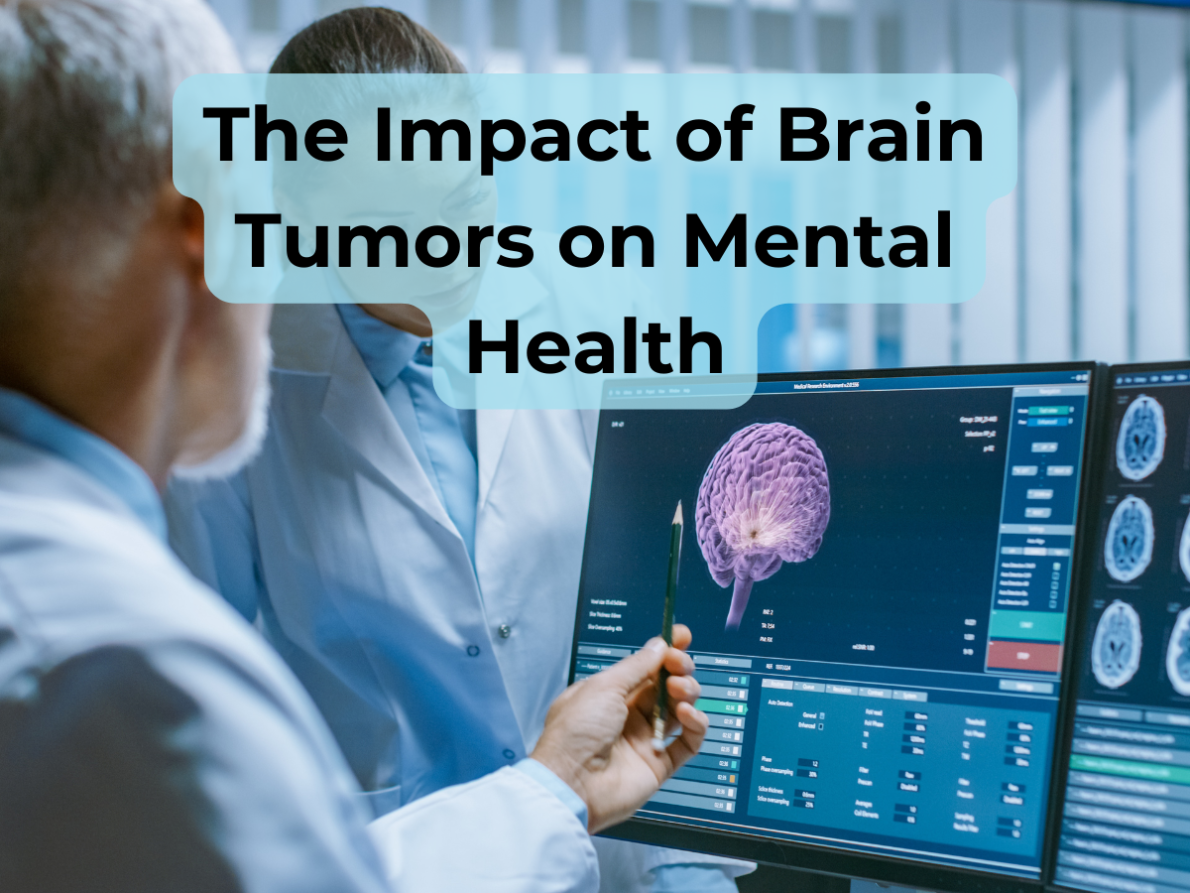The Impact of Brain Tumors on Mental Health

A brain tumor diagnosis affects more than just physical health—it can deeply impact mental well-being. The emotional and cognitive toll of both benign and malignant brain tumors is significant, and understanding these effects can help patients and caregivers navigate the journey with greater clarity.
How Brain Tumors Affect Mental Health
Depending on the tumor’s location and size, patients may experience a range of emotional and cognitive challenges. For example, tumors in the frontal lobe often influence mood and behavior, while those in the temporal lobe may affect memory and emotions.
Fatigue, apathy, and irritability are common, too, whether from the tumor itself or treatment. Addressing these mental health symptoms is crucial to helping you manage the broader impact of your diagnosis.

Cognitive Challenges in Brain Tumor Patients
Brain tumors can disrupt cognitive functions like memory, attention, and decision-making. These changes often make daily tasks more difficult, leading to frustration. For patients, the mental strain of struggling with concentration or memory lapses can add to the emotional burden of living with a brain tumor.
It’s common for these cognitive challenges to increase feelings of anxiety or depression, creating a cycle that impacts both mental and emotional well-being.
At The Preston Robert Tisch Brain Tumor Center, we work with patients to assess and manage cognitive symptoms, offering both medical interventions and emotional support to help them cope.
Emotional and Psychological Challenges in Brain Tumor Patients
Anxiety, depression, and stress are common emotional responses to a brain tumor diagnosis. These feelings can stem from both the physical impact of the tumor and the uncertainty surrounding treatment.
As the tumor grows or changes, psychological symptoms can intensify, making emotional well-being a critical part of care. Recognizing these challenges early on allows patients and caregivers to seek appropriate mental health support. Therapy, counseling, and support groups can be invaluable resources for managing these emotional effects.
Managing Mental Health During Brain Tumor Treatment

Caring for mental health is just as vital as treating the tumor itself. Taking a holistic approach ensures that both patients and their families have the resources they need to cope with the emotional and mental challenges of brain tumor treatment.
At The Preston Robert Tisch Brain Tumor Center, mental health support is integrated into all care plans to address both physical and emotional needs. Caregivers, too, experience stress and fatigue, which is why offering mental health resources for families is equally important.
Key support tools include:
- Counseling and therapy
- Cognitive Behavioral Therapy (CBT)
- Support groups for patients and caregivers
- Medication management
- Stress-reduction techniques
Why Choose Duke's Preston Robert Tisch Brain Tumor Center?
Choosing Duke’s Preston Robert Tisch Brain Tumor Center means receiving care that goes beyond just treating the tumor.
Founded in 1937, this center is known worldwide for its groundbreaking research and compassionate patient care. With over 250 dedicated neuro-oncology experts, Duke tailors treatment plans to each individual, considering both the physical and emotional challenges of a brain tumor diagnosis. Patients benefit from access to advanced clinical trials and the latest therapies, all within a supportive environment that prioritizes mental health and quality of life.
Duke’s team understands that a brain tumor diagnosis can feel overwhelming. That’s why their mission is to provide not only the most advanced medical care but also emotional support to patients and their families. The center’s integrated approach addresses every aspect of your well-being, helping you navigate the challenges of treatment with compassion and expertise.
This personalized, holistic care makes Duke a global leader in brain tumor treatment, empowering patients to face their diagnosis with confidence and hope.
Get Comprehensive Care at The Preston Robert Tisch Brain Tumor Center
The Preston Robert Tisch Brain Tumor Center at Duke is a global leader in brain tumor research and treatment, offering cutting-edge therapies and access to advanced clinical trials. Our team is dedicated to providing personalized care that addresses both physical and mental health, ensuring patients and their families receive the support they need throughout the journey.
Ready to explore your options? Schedule an appointment today to discuss your diagnosis and treatment plan. Our team of doctors offers treatment plans tailored to your or your child’s circumstances and goals. We also offer access to cutting-edge clinical trials to stay at the forefront of brain tumor treatment.
Want to learn more about brain tumor care? Explore related articles on our blog:
- How Does Brain Cancer Affect Everyday Life?
- How to Care for Someone with Brain Cancer
- Follow-up Care & Rehabilitation: What Happens After Brain Cancer Treatment?
FAQ: Brain Tumors and Mental Health
Can a brain tumor affect your emotions?
Yes, brain tumors can affect emotions, especially if they are located in areas like the frontal or temporal lobes. Patients may experience mood swings, irritability, or depression.
Can a brain tumor cause irrational behavior?
Yes, depending on the location, a brain tumor can cause irrational behavior, impulsiveness, or difficulty controlling emotions.
How does a brain tumor affect daily life?
Brain tumors can impact memory, concentration, physical coordination, and mood, making daily tasks more challenging.
Can a brain tumor cause altered mental status?
Yes, a brain tumor can lead to confusion, disorientation, or difficulty thinking clearly, especially if it grows and pressures specific brain areas.
What is usually the first symptom of a brain tumor?
Headaches are often one of the earliest symptoms, but seizures or changes in cognitive function may also be early indicators.
Can a brain tumor affect your thinking?
Yes, brain tumors can affect thinking, leading to problems with memory, concentration, and decision-making.
Can a brain tumor make you feel dissociated?
In some cases, patients with brain tumors may experience feelings of dissociation or detachment from reality due to emotional and cognitive disruptions.